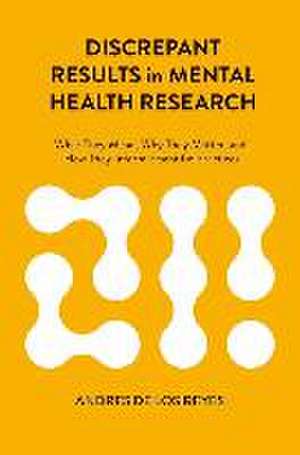Discrepant Results in Mental Health Research: What They Mean, Why They Matter, and How They Inform Scientific Practices
Autor Andres De Los Reyesen Limba Engleză Hardback – 13 noi 2024
Preț: 306.30 lei
Preț vechi: 388.94 lei
-21% Nou
Puncte Express: 459
Preț estimativ în valută:
58.62€ • 60.97$ • 48.39£
58.62€ • 60.97$ • 48.39£
Carte disponibilă
Livrare economică 13-19 martie
Preluare comenzi: 021 569.72.76
Specificații
ISBN-13: 9780197686607
ISBN-10: 0197686605
Pagini: 400
Dimensiuni: 165 x 237 x 30 mm
Greutate: 0.75 kg
Editura: Oxford University Press
Colecția OUP USA
Locul publicării:New York, United States
ISBN-10: 0197686605
Pagini: 400
Dimensiuni: 165 x 237 x 30 mm
Greutate: 0.75 kg
Editura: Oxford University Press
Colecția OUP USA
Locul publicării:New York, United States
Recenzii
Scientific studies often produce results that disagree. What to make of the discrepant findings? This book provides a scholarly, novel, and candid appraisal of discrepant results in mental health research. De Los Reyes draws from work in physics, medicine, history and more to make this a very engaging read. Assessment is core to all that scientists do and this book, largely focused on psychological science, has lessons that apply to science more generally as well as other domains such as government, policy, and law where assessments are used to monitor health, welfare, and social processes. The book provides a contribution without peer in how to conceptualize, use, and interpret assessments and the concrete implications that result.
In this important book, De Los Reyes provides critical insights into the problem of discrepant results in mental health research. Professionals in clinical psychology, psychiatry, social work, and education, as well as graduate students, will profit greatly from reading this thoughtful and inspiring book.
This book covers a lifetime of research that forms the bedrock of mental health intervention science as we know it today. Mental health researchers and clinicians recognize the importance of collecting data from a variety of different sources to effectively treat a patient. Yet, multi-source data will result in discrepancies. This volume is the first comprehensive treatise on the subject of âwhat to doâ with the inevitable complexity of discrepant data, and is accessible to a wide range of readers--from undergraduates to clinical scientists in the trenches of this work, as well as clinicians who must contend with discrepancies in patient care. De Los Reyes has made this area of research digestible to a broad audience in a way that no other scholar could.
In this important book, De Los Reyes provides critical insights into the problem of discrepant results in mental health research. Professionals in clinical psychology, psychiatry, social work, and education, as well as graduate students, will profit greatly from reading this thoughtful and inspiring book.
This book covers a lifetime of research that forms the bedrock of mental health intervention science as we know it today. Mental health researchers and clinicians recognize the importance of collecting data from a variety of different sources to effectively treat a patient. Yet, multi-source data will result in discrepancies. This volume is the first comprehensive treatise on the subject of âwhat to doâ with the inevitable complexity of discrepant data, and is accessible to a wide range of readers--from undergraduates to clinical scientists in the trenches of this work, as well as clinicians who must contend with discrepancies in patient care. De Los Reyes has made this area of research digestible to a broad audience in a way that no other scholar could.
Notă biografică
Andres De Los Reyes is Professor of Psychology at the University of Maryland at College Park. He is the Editor-in-Chief of the Journal of Clinical Child and Adolescent Psychology, and Chaired the American Psychological Association's (APA's) Board of Educational Affairs. He received the APA's Distinguished Scientific Award for an Early Career Contribution to Psychology, as well as an APA Presidential Citation. He is a Fellow of the APA and Association for Psychological Science, and a Fulbright Scholar.
